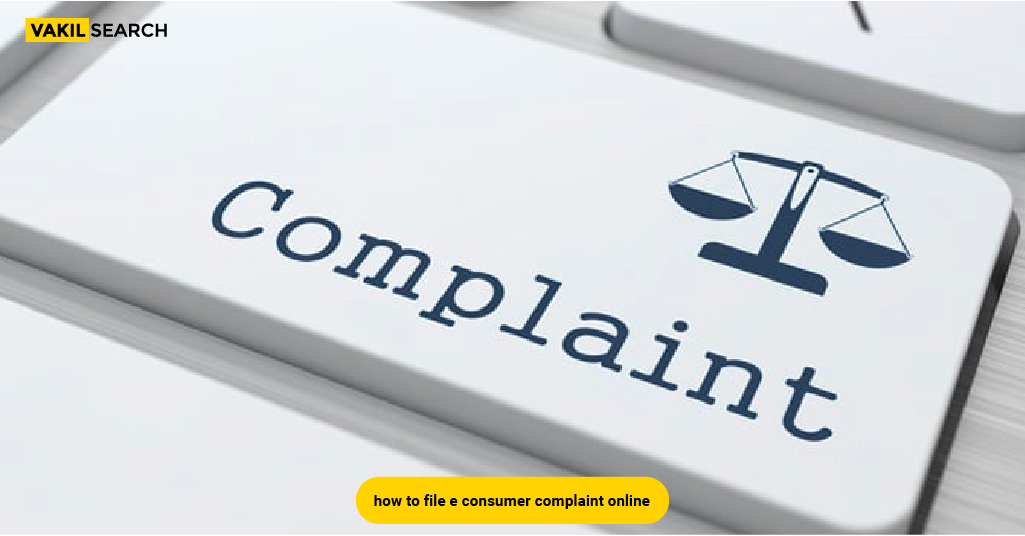Know how to file e-consumer complaints online with accuracy at Vakilsearch. Understand the benefits of e-filing consumer complaints.
What is an E-commerce Consumer Complaint?
An E-commerce Complaints Online is a grievance raised by a customer against an online retailer or service provider for unsatisfactory products or services. In simple terms, it is a legal recourse available to customers who have had negative experiences with online purchases. These complaints can arise due to various issues such as defective products, delivery delays, incorrect billing, false advertising, or poor customer service. The rise of e-commerce has made it easier for consumers to shop from the comfort of their homes, but it has also made it easier for businesses to engage in fraudulent practices. Therefore, consumer protection laws are necessary to safeguard the interests of online shoppers. Know about How to File E-consumer Complaints Online in this blog.
Eligibility Criteria to File an E-commerce Consumer Complaint Online
Consumer status: The complainant must be a consumer as per the definition provided under the Consumer Protection Act, 2019. A consumer is a person who buys goods or avails services for personal use and not for resale or commercial purposes.
Defective product or service: The complaint must pertain to a defective product or service that was purchased online. The product or service must not conform to the agreed-upon terms or meet the quality standards that were promised by the seller or service provider.
Jurisdiction: The complaint must be filed with the appropriate consumer forum or ombudsman depending on the value of the goods or services in question, and the location of the complainant and respondent.
Timeliness: The complaint must be filed within the prescribed time limit of two years from the date of purchase or provision of the service.
Exhaustion of remedies: The complainant must have exhausted all available remedies provided by the online retailer or service provider before filing a complaint. For example, the complainant must have attempted to seek redressal through customer care or refund policies before filing a complaint.
Meeting these eligibility criteria is crucial for filing a successful e-commerce consumer complaint in India. By doing so, consumers can hold online retailers and service providers accountable for providing quality products and services, thereby promoting transparency and fairness in e-commerce transactions.
Steps for Filing a Consumer Complaint
Step 1: The first step is to visit either the National Consumer Helpline’s website or the Consumer Online Resource and Empowerment Centre (CORE) website. These websites are designed to help consumers with their complaints and provide various resources and tools to empower them. You can find the websites by doing a quick search online. Take action against faulty products by applying for a legal notice for defective goods.
Step 2: Once you have reached the website, you will need to register yourself as a consumer by providing the required details. This will typically include your name, contact information, and address. This step is important because it helps to ensure that your complaint is processed efficiently and effectively.
Step 3: After you have registered, you can click on the ‘File a Complaint’ option to provide the details of your complaint. This may include information about the product or service you purchased, the nature of the complaint, and any relevant details that can help to support your claim.
Step 4: It’s important to attach any relevant documents that can support your consumer complaint. These may include purchase receipts, emails or chats with the seller, photographs of the product, or any other evidence that can help to prove your case.
Step 5: After you have provided all the necessary details, take some time to review your complaint and make sure that all the information is accurate and complete. Once you are satisfied, you can submit your complaint online.
Step 6: After you have submitted your complaint, you will receive a unique complaint number. This number can be used to track the status of your complaint and keep you updated on any progress. It’s important to keep this number handy and check on your complaint regularly to ensure that it is being processed in a timely manner.
Conclusion
Filing an e-commerce consumer complaint online is a simple process, and it protects your rights as a consumer. Following the steps mentioned above, you can file a complaint against an e-commerce seller or service provider easily. Always remember to keep all the relevant documents handy, and file the complaint within the specified time limit. With the growth of e-commerce in India, it is essential to be aware of your consumer rights and exercise them when needed. For any expert advice, contact Vakilsearch experts for guidance.
FAQs on E-consumer Complaints Online
How do I complain about an e-commerce customer?
To file a complaint against an e-commerce customer, you can follow the same procedure as mentioned above. However, the complaint, mentions the details of the e-commerce customer who has violated the terms and conditions.
Can we complain about online shopping?
Yes, you can complain about online shopping if you face any issues with the product or service purchased online.
What is e-commerce in the consumer protection act?
E-commerce is defined as the buying and selling of goods and services, including digital products, through electronic modes such as the Internet, mobile apps, etc. The Consumer Protection Act, of 2019, regulates e-commerce in India.
How do I file a case against online shopping?
To file a case against online shopping, you need to file a consumer complaint as mentioned above. The consumer court will hear the case and provide a verdict.
What are the 3 types of e-commerce?
The three types of e-commerce are Business-to-Business (B2B), Business-to-Consumer (B2C) and Consumer-to-Consumer (C2C).
Who regulates e-commerce in India?
The Ministry of Commerce and Industry, Government of India, regulates e-commerce in India.

